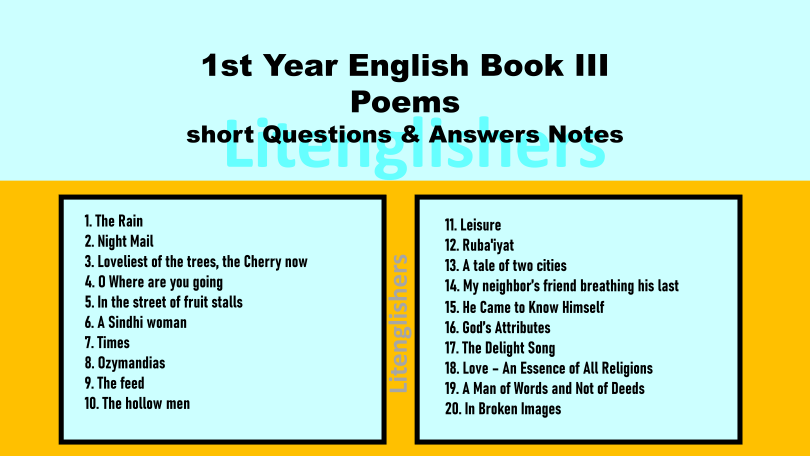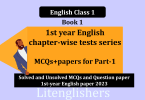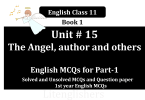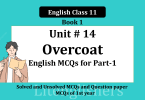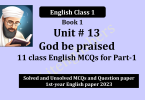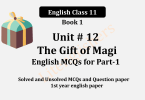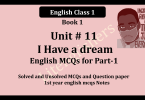Part-1 Book III Short Questions & Answers Notes
Here are 1st year Book III English poems important short questions answers notes. You can also download them in PDF format. We are presenting questions and answer notes of 1st year English book-3 poems. These will fulfill all the requirements of annual exams. In this way, these notes are very useful for 1st-year students. If you want to perform well in exams, you will have to prepare these notes. If you find any mistakes in these notes, comment us in the comment section to correct us.
1. The rain
Q.1. How can a rainy day be enjoyed?
One can enjoy the rainy day by watching the scene of rainfall and cooking different dishes.
Q.2. What would happen when the rain stops and the sun comes out?
Everything looks bright and lovely when the rain stops and the sun comes out.
Q.3. What does the poet hear while sitting near a tree on a rainy day?
The poet hears the raindrops falling on the leaves.
Q.4. What is the theme or lesson of the poem “The Rain”?
Ans: The theme of the poem is that the rain is a blessing of God which level up the class difference between poor and rich.
Q5. What does the poet mean by rich and poor leaves?
Rich leaves get more water than the lower leaves which means rich people enjoy all facilities than the poor.
2. Night Mail
Q.1: What does the Nigh Mail bring?
It brings postal orders, cheques, and letters for people from all walks of life.
Q.2: What is the reaction of birds on the arrival of Night Mail?
The birds turn their heads to see the coaches. They are not afraid at all.
Q.3: What is the effect of Night Mail on life on the farms?
Night Mail does not bring any change in life at a farmhouse. They just keep on with their work when she passes by.
Q.4: What is the reaction of sheep and dogs on the arrival of Night Mail?
They do not pay any attention to it. They just keep sleeping with their heads on their paws.
Q.5: From where does Night Mail pass?
Night Mail passes from plains, hills, farms, cotton fields, and moorlands.
Q.6. What is the theme of the poem “Night Mail”?
Night Mail serves the rich and poor alike.
3. Loveliest of Trees the Cherry Now
Q1. How does the cherry tree look like?
Cherry Tree standing on the way to the forest and it looks very beautiful, especially when it covers with snow it looks like it is dressed white.
Q2. What is a score? How old is the poet? What is the expected age of a man on earth?
A score means twenty. The age of the poet is twenty years. The expected age of a man on earth is seventy years.
Q3. What is the relationship of the white dress and Easter? What is the importance of Easter?
Easter is a festival for Christians and they wear a white dress on this festival so the cherry tree covered with snow looks like it wears a white dress to celebrate Easter.
Q4. Why does the poet feel that fifty springs are not enough to enjoy the beauty of the cherry tree?
Cherry tree looks very lovely so the poet feels that fifty springs are not enough to enjoy the beauty of the cherry tree.
4. O where are you going
Q.1. What does the fearer tell the farer? What is the horror say to the hearer?
Ans: The fearer tells the farer that there is no food and water and there is darkness everywhere in the way.
Q.2. What are the qualities of the rider as described in this poem?
Ans: The rider is optimistic, brave, and determined to carry out his journey.
Q.3. What is the significance of the title of the poem?
The title of the poem ‘O Where are you going’ gives us a message that there are always such people who do not let others make progress in life and always create troubles.
Q.4. What does the reader tell the rider about the valley?
The reader tells the rider not to go there. He tells that the valley is fatal, and furnaces burn there. The bad smell maiden him and he will die there.
Q5. What kind of feelings does the poet create in the minds of his readers?
The poet wants to create feelings of courage and he wants us to be brave in any situation.
Q6. What is the theme or central idea of the poem?
The central idea of the poem is that the way to glory is difficult but a man should need to be brave to make successful in life.
5. In the street of the fruit stalls
Q.1. What are the feelings of the poet standing in the dark?
The poor children face war and poverty. The poet reflects that the children are happy creatures as they do not worry about what is happening in the world and enjoy eating fruits.
Q.2. Why has the poet used ‘cannonballs’ to describe the fruits?
The poet is in horror due to war so has used cannon balls to describe the fruits because they look like cannonballs in the dim light.
Q3. Name of the fruits mentioned in the poem?
Malon, Gava, and Mandarin are the fruits mentioned in the poem.
Q.4. What is the theme of the poem ‘In the Street of the Fruit stalls”?
The theme of the poem is that war, agony, and poverty cannot crush human joy, love, and innocence.
Q5. Why do the children forget their surrounding after buying the fruit?
Children are innocent creatures, so a small thing can make them happy that is why they forget their surrounding after buying the fruits.
Q6. What did the children do after buying the fruits?
They break it open and let the juice wet their mouths, and fingers and eat with relish.
6. A Sindhi Woman
Q.1. Discuss the qualities of a Sindhi woman.
The Sindhi woman has a beautiful gait without any ripple. She is hardworking, strong, and active.
Q.2. Write a note on the gait of the Sindhi woman.
The Sindhi women walk gracefully in a rhythm, without any ripple. As she walks the cloth on her face is blown back.
Q.3. What is the moral lesson of the poem?
The poem gives us the lesson of hard work. The people who work hard are strong and can face difficulties.
Q.4. What picture of the Karachi slums is presented in the poem?
The Karachi slums present a miserable picture, they are full of dirt, broken glass, and waste material.
7. Times
Q1. What is the theme of the poem?
The poem tells the importance of time, that there is fix time to do everything ordered by God. Anything out of time creates disorder.
Q2. What is the importance of time?
There is fix time to do everything ordered by God. Anything out of time creates disorder and disturbs human activities.
8. Ozymandias
Q1. What did the traveller see in the desert?
The traveller saw a broken statue in the desert.
Q2. What was written on the pedestal of the statue?
It was written as…
” My name is Ozymandias, the King of Kings:
look on my works, ye Mighty, and despair!”
Q3. What was the statue’s condition that the traveller saw in the desert?
The statue’s body was broken away from the legs and sunk into the sand. Its condition was miserable.
Q4. What is the theme of the poem Ozymandias?
The theme of the poem is that pride hath a fall and death is a great leveller. It does not spare anyone
Q5. Who was Ozymandias?
Ozymandias was the proud king of kings but death makes him powerless and now nobody knows him.
9. The Feed
Q1. What is the moral lesson of the poem?
We should not use science for deadly purposes but to use it to produce grain to feed hungry people.
Q2. What is the worry of the mother sparrow?
The mother sparrow has one grain and ten young ones to feed so she is worried about how to divide with ten young ones.
Q3. How many young ones are to be fed? How does the sparrow distribute the grain?
The mother sparrow has ten young ones to feed. She splits the grain and distributes the food equally.
Q4. How many grains are to be fed the ten young ones?
There is only one grain to be fed to the ten young ones.
10. The Hollow Men
Q1. What is the moral lesson of the poem?
The poet tells us that modern men are devoid of wisdom, love, honesty, and sympathy. They are morally corrupt, worthless, and hollow inside.
Q2. What do the dead men think of the modern men?
The men in the past were more active than modern men so dead men think that modern men are devoid of wisdom, love, honesty, and sympathy. They are morally corrupt, worthless, and hollow inside.
Q3. How our voices are Hollow?
The poet that modern men speak a lot but convey nothing positive. Their words are meaningless.
Q4. Why does the poet consider the modern men as “The Hollow men”?
The poet considers modern men as hollow men because, they are morally corrupt, worthless, and hollow inside.
11. Leisure
Q1. What is the moral lesson of the poem?
In this poem, the poet tells that modern men to have no time for rest. He fails to enjoy the natural beauty around him.
Q2. What are the delights we miss in our daily life?
Modern men have no time so they cannot see the shining streams and we fail to enjoy the natural beauty around us.
Q3. Why does the poet call our life useless and worthless?
The poet calls our life useless and worthless because we have no time to stand and stare. We fail to enjoy the natural beauty around us.
12. Ruba’iyat
Q1. Who was Abraham?
Abraham was God’s prophet and had a strong faith in God because Allah saved him from the fire of Namrood.
Q2. What is verse than slavery?
Having no faith in God is worse than slavery.
Q3. Who cannot compete with the civilization of Makkah and why?
The West cannot compete with the civilization of Makkah because they are devoid of unity.
Q4. What has made the efforts of Muslims fruitless?
Love for God and humanity has departed from the Muslims. This has made the efforts of Muslims fruitless.
Q5. What is Iqbal message in the Rubaiyat?
Allama Iqbal gives the message of Muslim unity and building strong faith in Allah.
13. A tale of two cities
Q1. Why did the people look helpless and powerless?
The Americans dropped atomic bombs on Japan. As a result, many people lost their lives and the remaining were burnt and afraid. This made them powerless and hopeless.
Q2. Describe the action of devastation.
When America dropped the atomic bombs, thousands of people were killed and the remaining were in very bad condition. Everything was burnt and destroyed. There were clouds of smoke all around.
Q3. What moral lesson of the poem is?
The moral lesson of the poem is that the action taken in fury can destroy everything. It teaches us that we should face every problem bravely.
14. My neighbour friend breathing his last
Q1. When does a person remember God?
Generally, a person remembers God when he is in trouble.
Q2. What is the effect of death scene? Why does a person feel helpless about the death of a friend?
The death scene scares us. The death of a friend is very painful. On his death, we feel helpless because he will never come back again.
Q3. Without whose love Bullah is at loss?
Without the love of God Bullah is lost.
15. He came to know himself
Q1. Why does the poet put emphasis on how to know himself?
Man is the best creature of God, when a man knows himself, he knows God also, then he realizes that God’s love is the greatest asset of man.
Q2. What makes one entangled in love? Why is a man entangled in love?
A man entangles in love only when he feels that he should know the purpose of his creation.
Q3. Who was Mansur? Why did he mount the gallows?
Mansur was taken in by God’s love and mounted the gallows for the love of his beloved God.
Q4. What is the bare truth Sachal talks of in the poem” He came to know himself”?
The bare truth is that our stay on this earth is short and temporary.
16. God’s Attributes
Q1. How many of God’s attributes are mentioned by Rumi in the poem?
The attributes of God in the poem are “seeing”, “hearing”, and “knowing”.
Q2. What the knowing God attributes stop one from sinning?
When a man comes to know that God is seeing him every time, he stops to commit any sin.
Q3. What does Rumi say about God’s attributes in this poem?
Rumi says that God’s name is derived from his attributes when he says “seeing”, Knowing”, and “hearing”, which are effective for character building and stop us to commit any sin.
17. The delight Song
Q1. What are the things that keep a person alive?
Close relation with others and nature keeps a person alive.
18. Love an essence of All Religions
Q1. What is the main moral lesson of the poem?
Love is the passion that makes us unite. Life without love is worthless.
Q2. What is the effect of the power of love?
Love is the passion that makes us unite. It changes thorns into roses, bad luck into good luck, and sickness into health. so Life without love is worthless.
Q3. Is life worth living without love?
Love is the passion that makes us unite. Life without love is worthless.
19. A Man of Words and Not of Deeds
Q1. What is the moral lesson of the poem?
The moral lesson of this poem is that we should not be lazy and talkative but do something productive. A man of words but not of deeds can never succeed.
20. In Broken Images
Q1. What is the moral lesson of the poem?
One who trusts one’s clear images without any proof becomes dull, while the other who mistrusts his broken images becomes intelligent. It means a man should be realistic and do hard work in life.
To get the PDF Click on the Download Button
